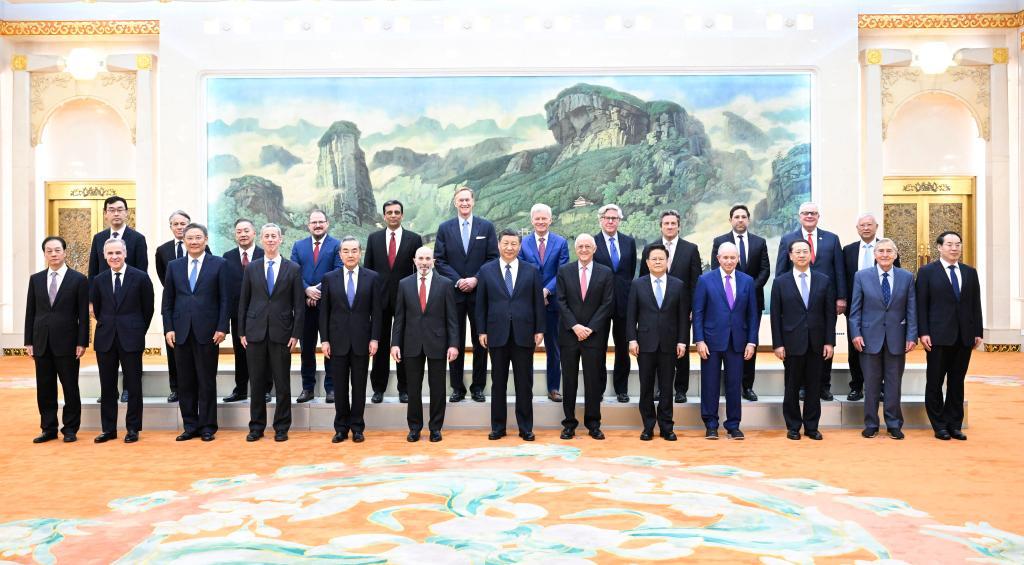
Chinese President Xi Jinping walks with representatives from American business, strategic and academic communities in Beijing, China, March 27, 2024. [Photo/Xinhua]
By Liu Chunsheng
In the grandiose setting of the Great Hall of the People in Beijing, Chinese President Xi Jinping's meeting with representatives from the American business, strategic and academic communities has underscored the fundamental complexities inherent in the Chinese-American relationship, a bilateral entanglement that remains one of the world's most pivotal.
This assembly comes at an opportune moment in spring – a season symbolically regarded as a time of renewal and growth, and a metaphoric backdrop for what could be a new chapter in China-U.S. relations.
The conciliatory and future-oriented rhetoric from President Xi during the meeting serves as a salient reminder of the intertwined destinies of the two countries whose fates are mutually dependant not just on each other's prosperity, but also on the robustness of the global economy. President Xi's appeals for cooperation over confrontation resonate with greater urgency amidst the geopolitical tensions and economic uncertainties of the current era.
The purpose of this high-profile meeting was twofold: to facilitate a candid dialogue on pressing concerns within the Chinese-American dynamic and to explore pathways to reignite cooperative flames in sectors where mutual benefits can be harnessed.
The acknowledgement of the collective authorship of the bilateral history by the people of both nations signals a shift away from purely diplomatic or state-level interactions to more people-centric engagements, arguably a strategic move to deepen relational fabrics beyond the governmental sphere.
In delving into the narratives woven during the convocation, President Xi's assertion of the healthy and sustainable nature of China's economy – despite the challenge of skepticism from certain quarters – reinforced China's confidence in its developmental model. The claim that China's economic growth has outpaced that of other major economies, contributing significantly to global economic expansion, serves to reaffirm China's position as an engine of global growth.
Looking at the present state of China-U.S. business cooperation, there's been a mix of keen engagement and cautious hedging. U.S. firms, while aware of the market potential within China, have to navigate trade tensions.
But beyond existing frameworks lies a future where China vouches for an unceasing commitment to reform and opening-up. The planned implementation of substantial reform measures, as delineated by Xi, pledges to create a prime environment for international businesses, inclusive of American firms, to thrive.
One should not dismiss these overtures as mere rhetoric, for they arrive at a time when China pursues its economic development pattern of "dual circulation" where self-reliance and openness are not contradictory but complementary trajectories.

Chinese President Xi Jinping meets with representatives from American business, strategic and academic communities at the Great Hall of the People in Beijing, capital of China, March 27, 2024. [Photo/Xinhua]
The strategic imperative for both nations to expand and deepen economic and trade cooperation, despite frictions, cannot be overstated. The global economic landscape, distressed by shifting supply chains and nationalistic trade policies, yearns for stability and a recommitment to the principles of mutual respect.
The call to engage in areas as diverse as traditional trade and emerging sectors, like artificial intelligence and climate change, is an invitation to co-write a script of shared progress and to navigate the choppy waters of technological hegemony and competition with prudence.
President Xi's remarks suggest the potential for the Belt and Road Initiative and events like the China International Import Expo to serve as solid platforms for American businesses to more deeply engage with China's immense market. There is hope that such participation might foster an environment conducive to win-win outcomes, with American companies investing in, and profiting from, China's growth while contributing to the vibrancy of the global economy.
The dialogue between President Xi and U.S. delegates probes one of the world's most consequential relationships, revealing nuanced perspectives and an appetite for progress. As a signpost for the future, the key takeaway is that while challenges are undeniable, so are the opportunities for impactful cooperation. The meeting fully demonstrates China's consistent commitment to pursuing mutually beneficial cooperation and building a new model of major country relations featuring mutual respect and win-win cooperation between China and the U.S.
In the face of the turbulence in the bilateral relationship in recent years, China has always remained steadfast, avoided confrontation and conflicts, and endeavored to manage differences, expand cooperation, and stabilize the overall relationship. This high-level meeting sends a positive signal for the advancement of China-U.S. relations.
In weaving a path forward, both nations must advocate for a judicious balance of interests and strategic patience, exploring coexistence modes that eschew zero-sum mentalities. By reinvigorating communication channels and fostering understanding and trust across various societal levels, China and the U.S. could spearhead a global renaissance rooted in sustainable prosperity.
This bilateral interaction thus not only charts a course for stronger Chinese-American ties but also exemplifies a profound commitment to addressing global economic challenges and setting a paradigm of cooperative leadership in a world that is full of uncertainty.
Liu Chunsheng, a special commentator on current affairs for CGTN, is an associate professor at the Central University of Finance and Economics in Beijing.

 中文
中文



